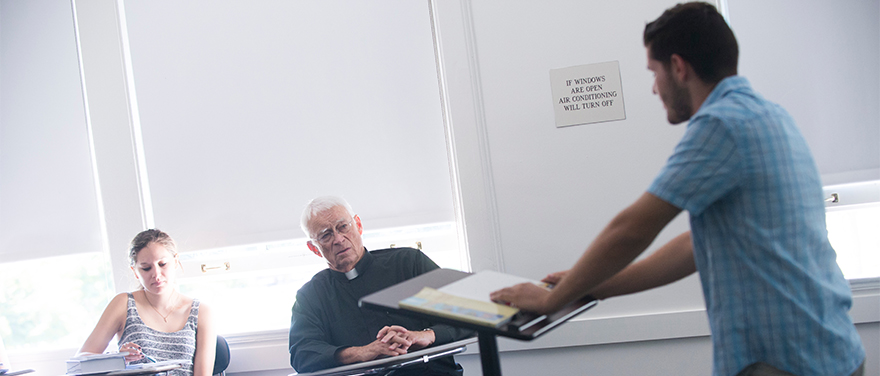Theological Studies

What is Theological Studies?
LMU's Theological Studies major provides students the opportunity to reflect on personal religious experience and the chance to explore a particular religious tradition. In the process, students learn how to analyze texts, think and write critically, and integrate reason and faith.
The Department of Theological Studies is committed to the encouragement of learning within the intellectual and cultural heritage of the Catholic tradition. This heritage values imagination and intellect, seeks an integration of knowledge, and promotes ecumenical and interreligious discourse.
Theological Studies seeks to educate the whole person and to serve faith by an academic exploration of its possibilities, challenges, and ambiguities in dialogue with the contemporary world.
What do Theological Studies majors do?
Theological Studies majors investigate the broader area of religious experience. Areas of study include biblical, historical, systematic, and moral theology; world religions and comparative theology; and pastoral theology, with special emphasis on the Roman Catholic theological tradition. Lay ministry and pastoral theology programs offer additional ministry and counseling emphases.
Theological Studies majors also delve into ethnic issues relating to theology in the United State. Offerings include Latino theology and the African American religious experience. Majors must take a sequence of courses in the five subdisciplines of theology, and complete a capstone seminar on a major Christian thinker.
Is this major right for you?
You might be a Theological Studies major if you:
- Value scholarship
- Follow world events
- Are curious about moral, social justice, and philosophical questions
- Have interest in faith and contemporary culture
- Are interested in the nature of religion
About our faculty
Our faculty members are expert in fields such as New Testament studies, Islam and the lives of Muslims, bioethics, religion and ecology, the intersection of theology and public policy, the theory and history of catechetics, Catholic faith and culture, and Christian spirituality.
Our faculty members have conducted research in Europe, Africa, Australia, Japan, and South Asia. Professors have taught courses such as "Prophecy and Social Justice," authored books such as Ethics: Twentieth Century Portraits, written for important journals, earned doctorates from leading seminaries, served on advisory boards, and been active in the LMU Center for Religion and Spirituality.
About our students and graduates
Upon graduation, majors should be able to conduct critical research and write intelligently and persuasively on theological and religious issues. They should be able to critically interpret theological or religious texts, and articulate the significance of theological and religious values for church, society, and culture.
Our majors have gone into teaching, business, film, and the arts. Many have attended graduate school in theology or other disciplines, including medicine and law. Graduates are in high demand as high school teachers, campus ministers, parish workers, and pastoral ministers. Many have become physicians.
Representative courses
Our courses have included:
- Introduction to the Old Testament
- Introduction to the New Testament
- Introduction to Christian Ethics
- Islam in the Modern World
- World Religions and Ecology
- Prophecy and Social Justice
- War and Peace in the Bible
- Jesus in Gospel and Film
- Women in Christian History
- The Old Testament in Gospel and Blues
- Dante's Inferno
- Christian Ethics in the Marketplace
- Medieval Theology
- After Eden
- Independent Studies